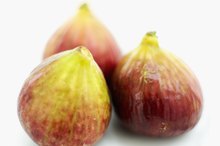The Side Effects of Cherries
Unless you’re allergic to cherries, these fruits are unlikely to cause serious side effects. However, eating cherries in excess or as part of a very high-fiber diet may lead to unpleasant effects. To avoid these potential side effects and ensure all of your daily nutrient needs are met, eat cherries and other fruits in recommended portions.
Fiber-Related Side Effects
Cherries are somewhat high in fiber, containing about 3 grams of fiber in each 1-cup portion. While this amount of fiber is unlikely to cause side effects, if you eat cherries as part of a very high-fiber diet you may experience intestinal gas, abdominal cramps or bloating, especially if you drastically increase your fiber intake over a short period of time, notes MedlinePlus. High-fiber diets contain about 25 to 30 grams of fiber daily, notes the University of California San Francisco Medical Center. Other fiber-rich foods include other types of fruit, vegetables, whole-grains, nuts, seeds and legumes.
- Cherries are somewhat high in fiber, containing about 3 grams of fiber in each 1-cup portion.
- While this amount of fiber is unlikely to cause side effects, if you eat cherries as part of a very high-fiber diet you may experience intestinal gas, abdominal cramps or bloating, especially if you drastically increase your fiber intake over a short period of time, notes MedlinePlus.
Nutrient Deficiencies
Cherries and Weight Loss
Learn More
Although cherries are packed with nutrients, eating them in excess can cause nutrient deficiencies if you’re eating cherries in place of other essential nutrients. While cherries are rich carbohydrates, including natural sugars, fiber, vitamin C and potassium, they lack sufficient amounts of other vitamins and minerals, dietary protein and heart-healthy monounsaturated fat. However, eating cherries in recommended portions as part of a well-balanced meal plan likely won’t lead to nutrient deficiencies.
Allergic Reactions
If you have an allergy to cherries, eating them may cause unpleasant -- even dangerous -- side effects. The American Academy of Allergy Asthma and Immunology notes that an individual with a cherry allergy had sensations of her throat closing, shortness of breath and hives. If you experience any of these symptoms after eating cherries, avoid them in your diet and see your health care provider. If you do have a cherry allergy, you may also have allergies to other fruits.
- If you have an allergy to cherries, eating them may cause unpleasant -- even dangerous -- side effects.
- If you experience any of these symptoms after eating cherries, avoid them in your diet and see your health care provider.
Recommended Portions
The Effects of Pistachios on Blood Glucose
Learn More
Unless you’re allergic to cherries, eating them in recommended portions as part of a well-balanced diet will help you avoid potential side effects from excessive cherry consumption and nutrient deficiencies. The Dietary Guidelines for Americans 2010 suggests eating 1.5 cups from the fruit group -- including cherries -- daily when eating 1,600 calories per day, 2 cups of fruit when consuming 2,000 calories daily and 2.5 cups from the fruit group each day when following a 2,800-calorie meal plan.
Related Articles
References
- MedlinePlus: Fiber
- University of California San Francisco Medical Center: Fiber Supplements
- American Academy of Allergy Asthma and Immunology: Anaphylactic Reactions to Cherries, Strawberries and Grapes
- Cherries, sweet, raw. FoodData Central. U.S. Department of Agriculture. Published April 1, 2019.
- Glycemic index of foods. Queensland Government. Updated 2014.
- Kelley DS, Adkins Y, Laugero KD. A review of the health benefits of cherries. Nutrients. 2018;10(3). doi:10.3390/nu10030368
- Cherries. American Institute for Cancer Research. Updated 2020.
- Moore M. 4 types of foods to support memory. Academy of Nutrition and Dietetics. Updated 2020.
- Anaphylactic reactions to cherries, strawberries, and grapes. American Academy of Allergy Asthma & Immunology. Updated 2018.
- Mekonnen S. I swallowed a cherry pit!. Poison Control National Capital Poison Center.
- Low FODMAP diet. University of Virginia Health System.
- Cherry varieties. Utah State University Extension. Updated 2017.
- Storing. The Victorian Cherry Association.
Writer Bio
Erin Coleman is a registered and licensed dietitian. She also holds a Bachelor of Science in dietetics and has extensive experience working as a health writer and health educator. Her articles are published on various health, nutrition and fitness websites.









